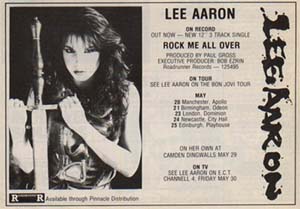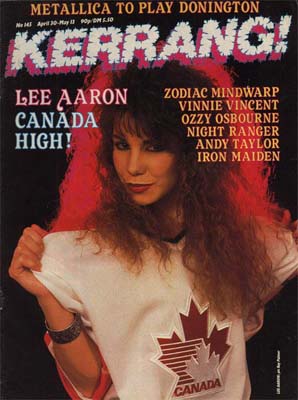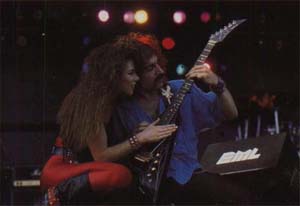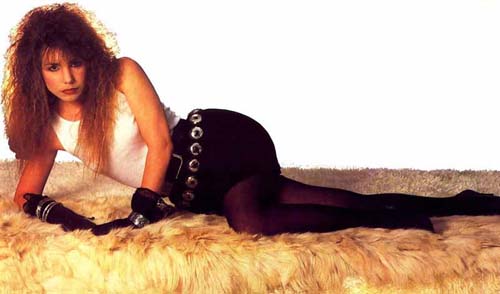


|
FIBM: Who were some of the bands you toured with in 1984? Was there a favorite?
Lee Aaron:
Motley Crue, Ratt, Bon Jovi in '85. The Crue guys were really nice and gentlemanly - to me anyway.
FIBM: In 1985 you released Call of the Wild? I remember, at the time, thinking what a great record it was...no fillers, great musicianship,
I really thought you were going to be the next Pat Benetar, but better. Although, overseas and in Canada, as far as I understand,
they seemed to get it. But here in the States, a lot of people did not know who you were.
Did your label not promote as much in the States? Any thoughts about that, or frustrations during that time?
Lee Aaron:
It's a rather complicated story. When I signed with ATTIC Canada in 1984 I gave away my
worldwide distribution rights (another piece of bad advice from manager #1) so basically
it was up to them to secure US distribution. The president of the label had a dream to
start ATTIC AMERICA, and wanted me to be the leading act on the label. For quite a few years
he tried to get investors on board and launch the label with enough funding, but it never
happened. In the meantime, between '85 and '91 several US offers came and went. The president
of ATTIC was holding out for a label deal - he wanted a US distributor to take on all his acts -
when most only wanted to sign me. I had no control over that. Also, the VP of Attic was also in
charge of marketing in the early 90's. I had fought very hard to earn back credibility and respect
after the Bob Connolly (first manager) days. This VP took out full page add for the first single
off the album 'Sex With Love' in a well know Canadian trade magazine that basically said "Hear SEX on the radio - see
SEX on TV - see SEX on tour." I flipped. In 1992 it was the reason I fought to get off ATTIC altogether.
FIBM: How was it working with famed producer Bob Ezrin? Any memories
from those recording sessions come to mind. Was he sober at that time? Did he share any cool Kiss / Pink Floyd stories?
Lee Aaron:
I worked with Bob Ezrin when I was only 23 years old. I was in awe of him and his
accomplishments. He pulled in Dick Wagner - Alice Cooper's guitar player to lay
down a few tracks as well as to present a couple of tunes to us. I also think he
wanted a buddy from his glory days to hang with while in Canada…..after all we
were just a bunch of kids. At one point he locked John Albani and I out of the
control room for hours because he was experimenting with a mix idea on the
intro of "Barely Holdin' On". When he finally allowed us to set foot back
in the studio he had stripped the intro of every single instrument except
a click track and vocal. Albani and I were dumbfounded. This is what
took 5 hours? Was Ezrin sober? Nope. It was obvious that our production
budget was being spent on a few extraneous luxuries besides gear and studio time.
FIBM: How did you meet John Albini and what was it like to work with him, throughout the years?
Lee Aaron: I met John in 1984 when he was hired by my first manager to come on
board to sing background vocals and assist with song arrangements for "Metal Queen". He and I hit it off and
formed a strong songwriting partnership that lasted 11 years. He also strongly disagreed with the overt sexual
marketing that Bob Connolly was subjecting me to at the time and talked me into walking out on my management
deal the following year. I learned a lot from John in the beginning.
FIBM: Do you stay in contact with him? Why did you part ways?
Lee Aaron: We talk occasionally still. He lives and works out of Nashville these
days and has a successful production company. We parted ways in 1995 amiably as we were moving in different
directions musically.
FIBM: During the 80's, what did you think of Lita Ford?
Lee Aaron: During the '80's our paths never crossed.
|

